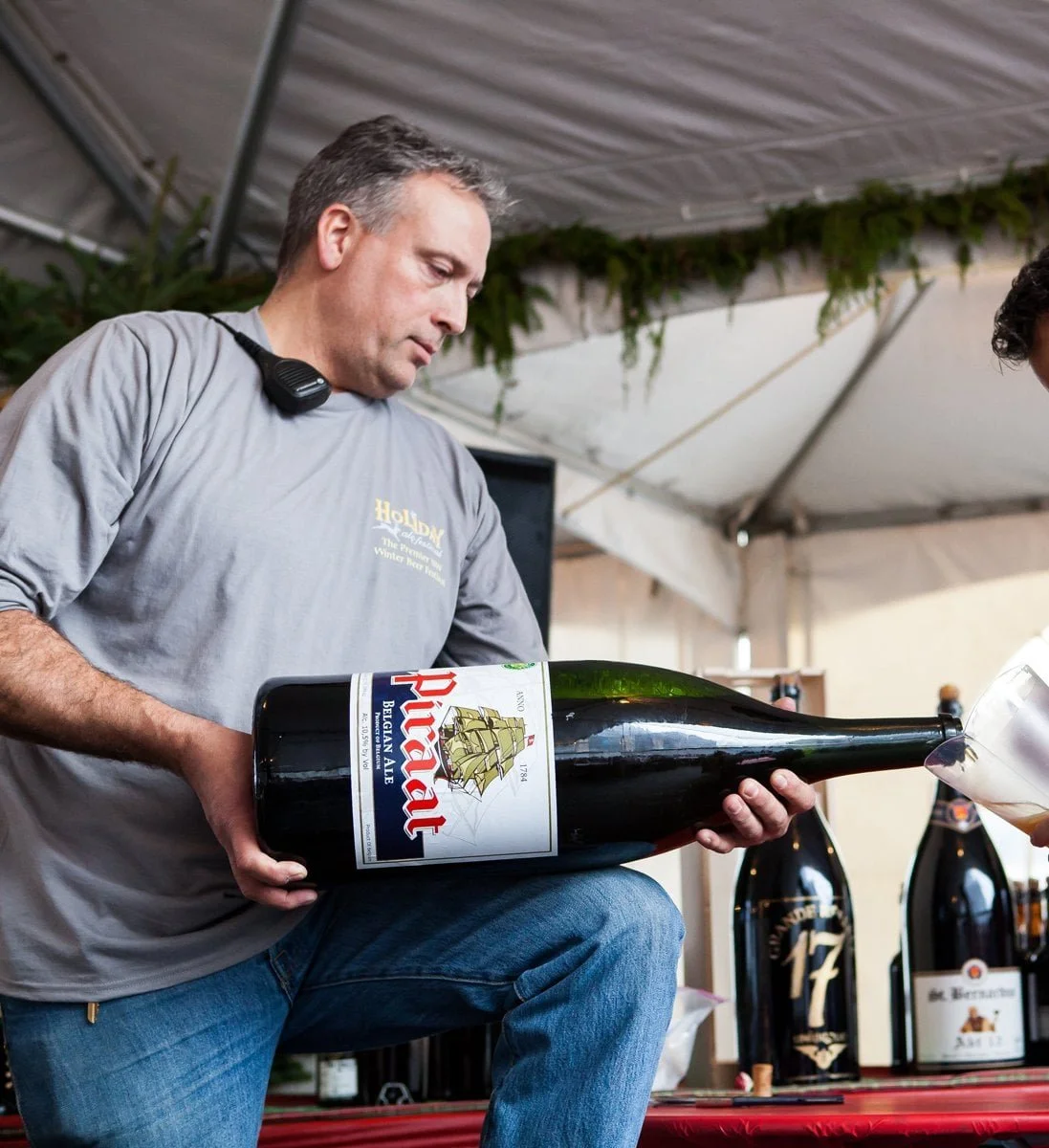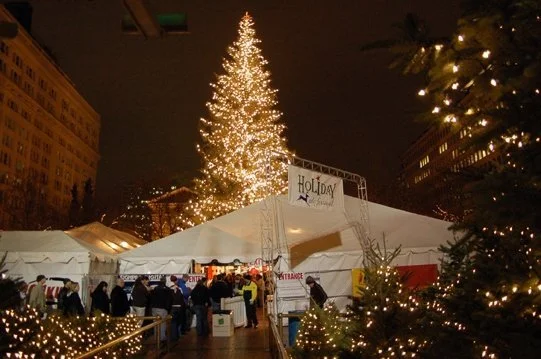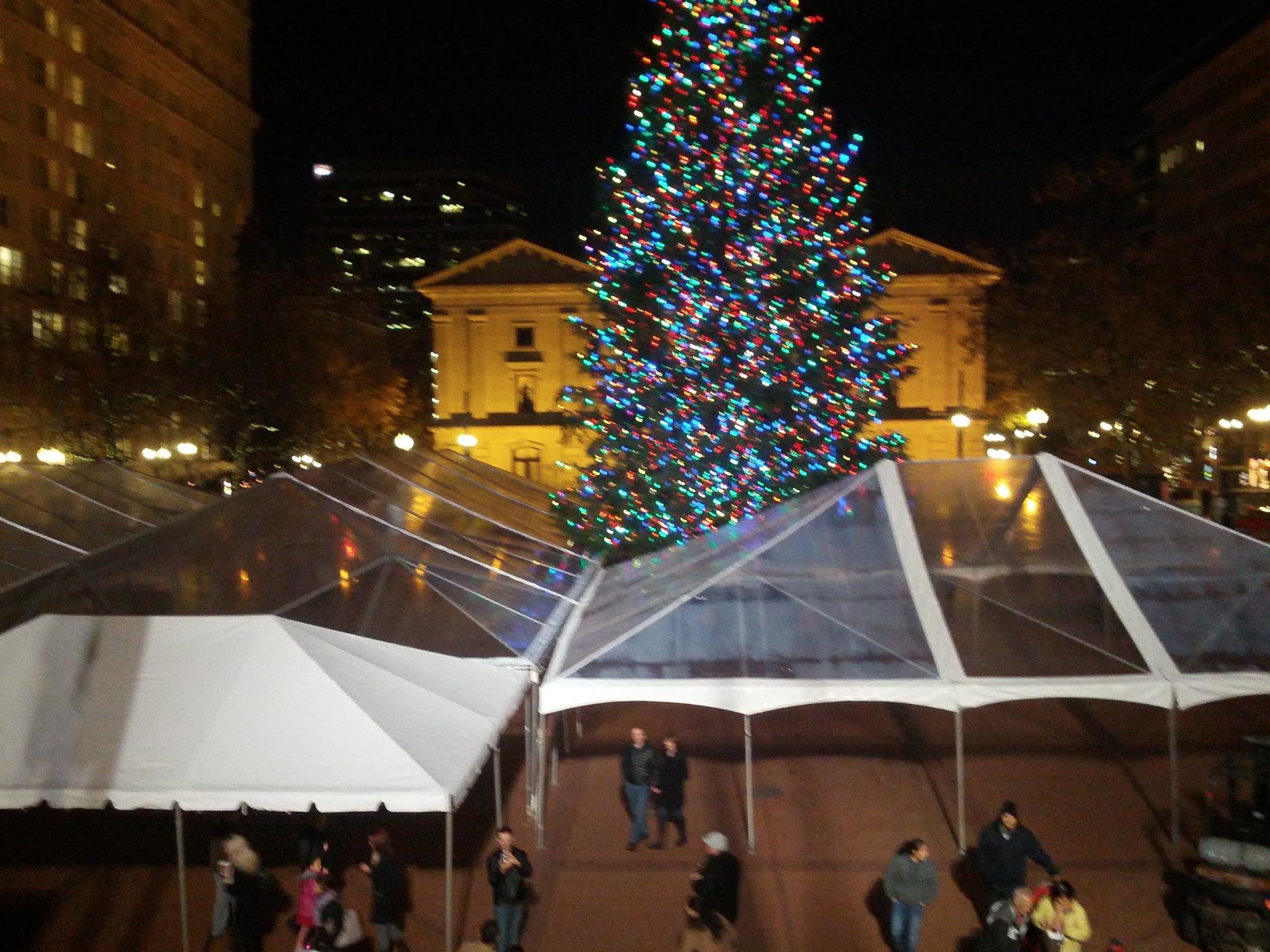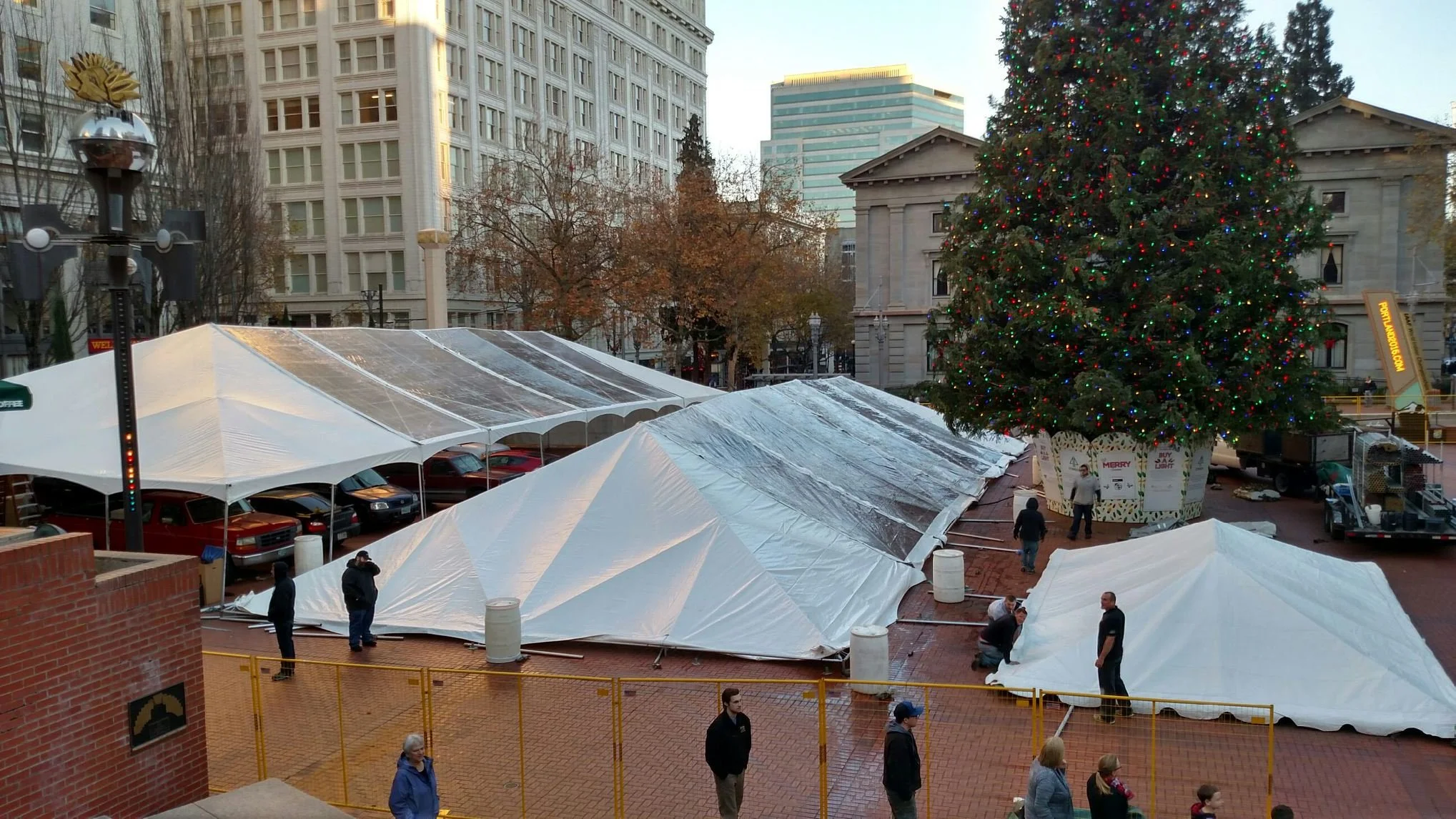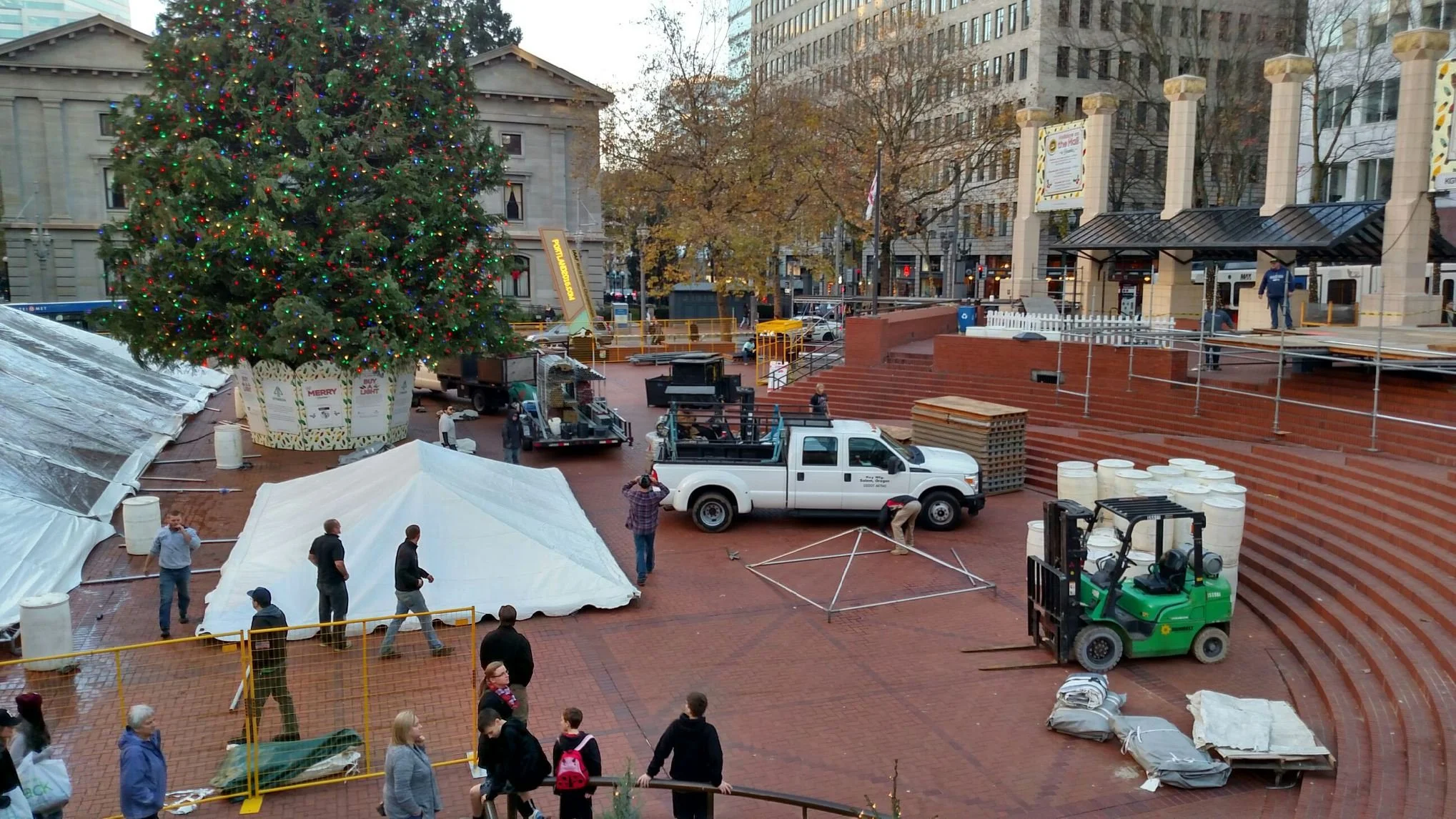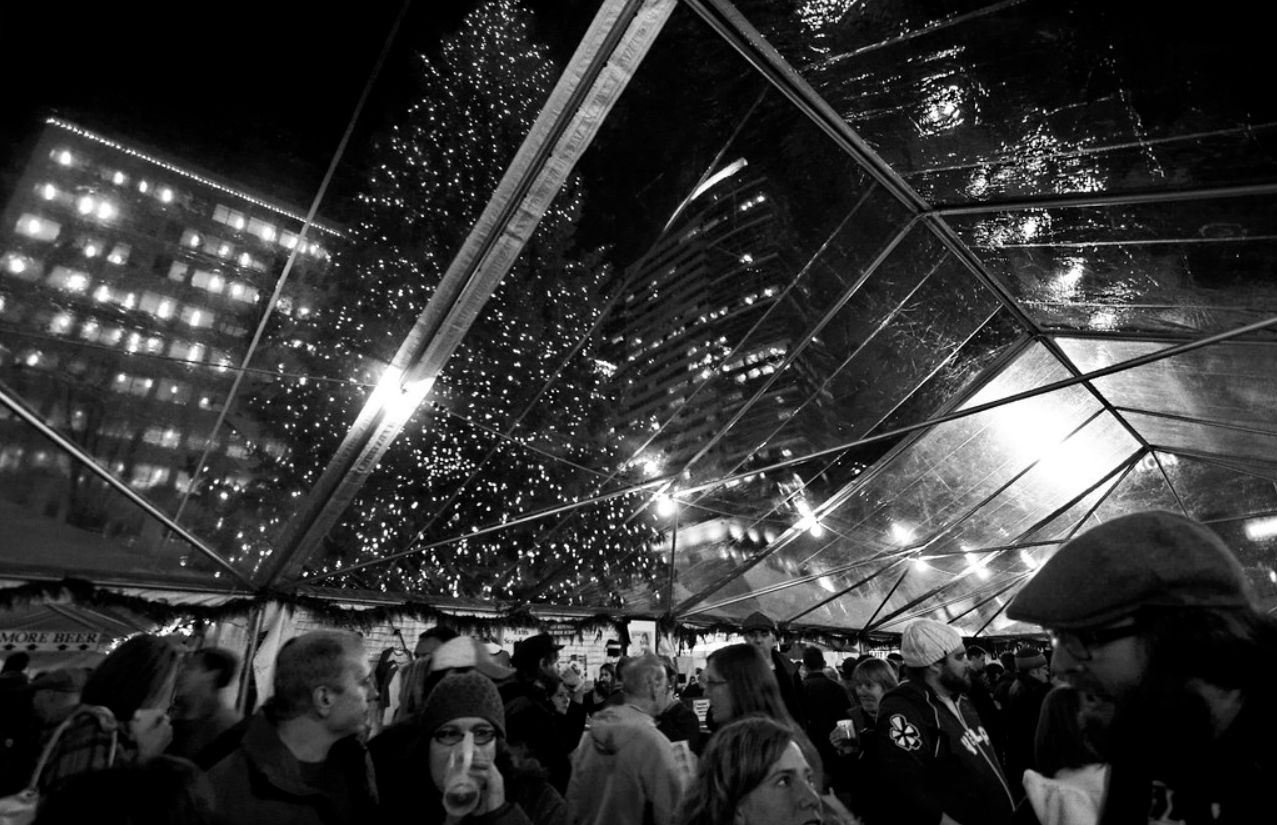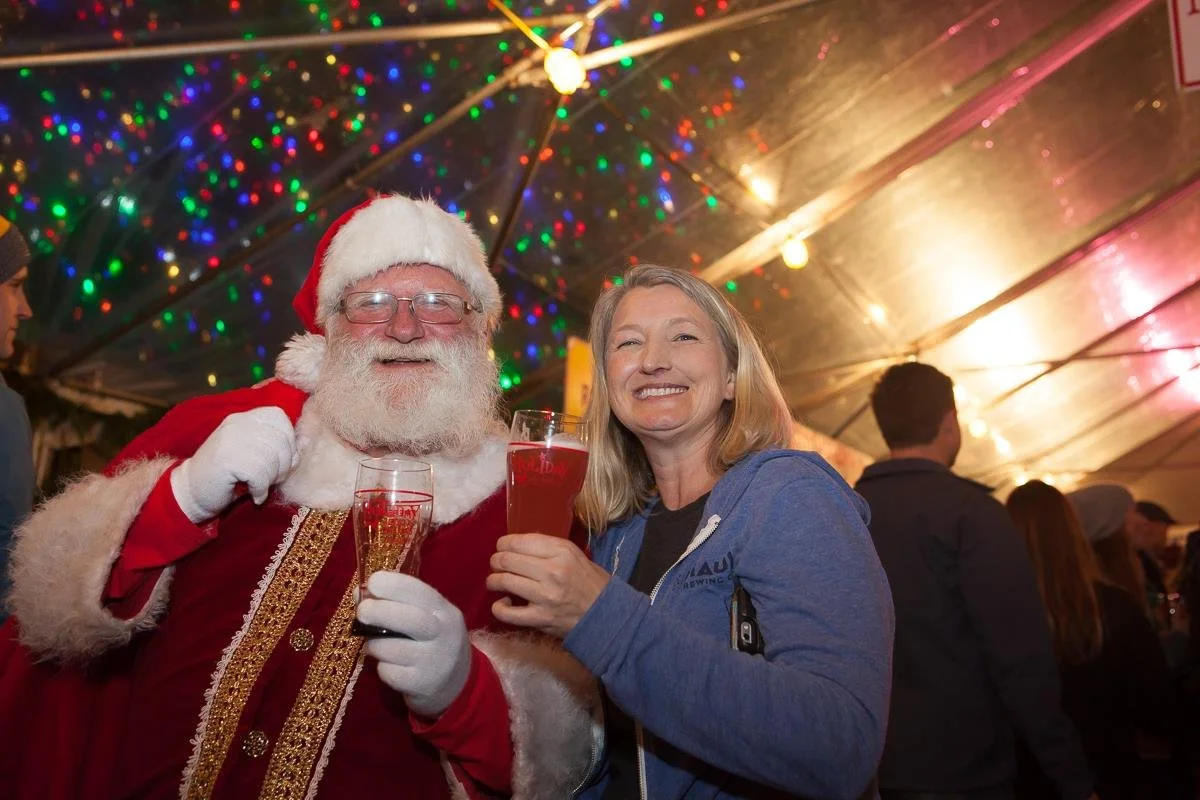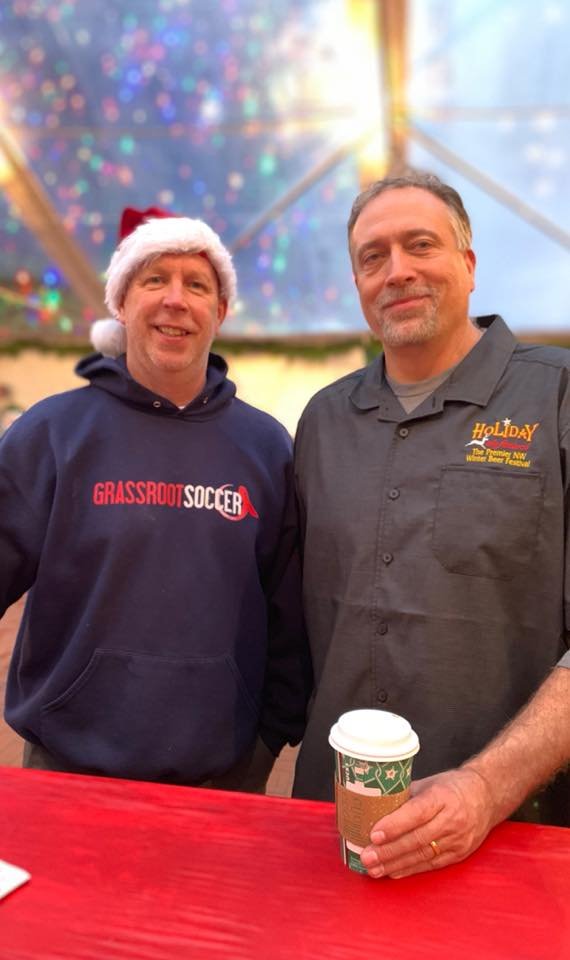The Oral History of Portland’s world-famous Holiday Ale Festival
For 24 years beer lovers gathered the first weekend of December in Portland, Oregon’s living room underneath a 75’ ft tall Christmas tree to enjoy barrel-aged beers and winter warmers. 2022 marks the third year in a row now that there has not been a Holiday Ale Festival (HAF), after understandably missing 2 years due to the COVID-19 pandemic many people thought this would be the year for it’s return. But it was not to be. This is just another bump in the long, strange, journey of the Holiday Ale Festival, that has overcome car bombs and proud boy rallies to become one of the most influential beer festivals of all time.
The Holiday Ale Festival was one of the first beer festivals to bring an elite class of uber-beer nerds and introduce many to winter warmers. It was a beer festival by and for beer nerds who wanted to try something different, with barrel-aged, exclusive festival-only, rare, and cellared vintage beers when they were few and far between. It didn’t start that way, in its early years it had to fight to prove any relevance whatsoever
Preston Weesner is a familiar face for anyone who has been in the industry for a long time, he owns the Holiday Ale Festival but started as just a volunteer. In 2002 he purchased it, at a time when the original organizers were struggling to find the event’s footing and it’s voice. Over the years, it has become tied to Weesner’s personal taste and preferences, an extension of his own reputation in the industry. "It was kind of a winter takeoff of the OBF, you could say, but, the difference being that there was going to be rain, there was no doubt about it," says Weesner.
“Back then there were two 10’ x 40’ tents with a gap in between, so you would run through the rain to get a beer in one tent and run back through the rain to maybe get food or talk”
The “The 12 Ales of Christmas” Winter Ale Festival, as it was originally called, was the brainchild of Gill Campbell of Campbell Productions, who pitched it to Art Larrance of the Oregon Brewers Festival. Larrance teamed with local marketing firm Koopman Ostbo to produce the festival, with Campbell at the helm. The idea was to capitalize on local breweries’ winter releases and featured such winter flagships as Full Sail Wassail, Rogue Yellow Snow, and Golden Valley Tannen Bomb.
After a modestly successful first two years, the owners decided they did not want to continue, but Larrance wanted to retain the Winter Ale Festival name for possible use in the future. Campbell took over and decided to take a year off before returning under the new name Holiday Ale Festival with the biggest tent they could find.
"I think it was a 40' x 40', and they had another one next to it," recalls Weesner who was just a volunteer the first year and came back as the bar manager. At the time, Weesner was not in the beer industry but worked in heavy construction. He found himself regularly lying to his boss so that he could get off and help at beer festivals.
"My boss was a very Christian man and didn’t believe in alcoholism," remembers Weesner. "If I told him I needed time off for a beer fest, he would say ‘I don’t know if I can get behind that.’ But if I told him I was going elk hunting with all the boys, he was excited to hear that maybe we didn’t get an elk but maybe drank some whisky by the fire and had a great time."
Weesner would help out "Carpenter Carl,” a guy who builds the sets and constructs much of the infrastructure at both Oregon Brewers Festival and then the Holiday Ale Fest. They would come in and set up chairs or build walls, then help the keg crew load trucks or hook up jockey boxes to pour. At the time fest owner Campbell was also running an event at the Portland International Raceway called the Portland Historic Races that was very successful. Eventually, she scored a plug gig running Laguna Seca Raceway in California; this led to her giving up the Holiday Ale Festival, which had accrued some debt.
"I didn’t know you could buy a beer fest," exclaims Weesner, recalling the day when Campbell asked him if he wanted to purchase the HAF. "I truly loved the event, it had a feel like no other. You're underneath a tent drinking beer in Pioneer Courthouse Square where it’s illegal to drink. So many things about it were so wrong but it was so right." So Weesner cashed in some retirement funds, lined up some investors, and raised the capital to buy the fest. He took over in 2002 with Campbell onboard to co-manage. In 2003, Campbell left Weesner to run the fest on his own.
"It was like being dropped in the water and not knowing how to swim," remembers Weesner. This would be his first event where he was really in charge. In 2003, the Holiday Ale Festival had an attendance of about 2,800 and the beer list was nowhere near as unique and crazy as it is today.
2009 Holiday Ale Festival, photo by Matt Wiater
"If you have been drinking long enough, you know there was a time in the brewery world where they had their core lineup, and they had a spring, a fall, and a winter seasonal, and that was as exciting as it got." The HAF poured around 21 or 22 beers from about half that many breweries; they were the standard fourth quarter seasonal releases that you could find at the breweries and local bars. "We were still young enough in our understanding of festivals and beers that the true Northwest beer drinker wasn't there yet; and the people who show up in the rain and the cold and still drink weren't showing up yet."
Eventually breweries started making more specialty beers; you had to have an early summer seasonal and a late summer seasonal, etc. The transition to the big, barrel-aged and spiced beer lineup that the Holiday Ale Festival is known for now had to happen gradually. HAF was one of the first to collaborate with brewers on new exclusive beers. It was a natural continuation of Weesner’s friendly relationship with brewers at places like New Old Lompoc and Max's Fanno Creek. "I had friends who were brewers. We would get together and talk and say 'hey, what do you wanna make?' These ideas would just spring forth." Weesner credits some of the growth in variety to Widmer's Collaborator project with the Oregon Brew Crew where they actively sought to brew unrepresented styles that were not readily available. "It really encouraged brewers to step it up a notch," says Weesner. "It was easy to talk to the brewers and say, 'hey is there anything you have always wanted to brew and haven’t?' They'd say, 'I've always wanted to make a Baltic Porter,' so they'd make it and we'd release it at the fest."
The transition to big, dark and barrel-aged wasn't really a conscious one and to this day, Weesner feels people ignore that there are other styles and lower ABVs represented in their lineup. He’s even found he’s had to push against brewers going too far toward the bigger darker beers. "We have actually tried to talk breweries down on the ABV sometimes," reveals Weesner.
Before the pandemic the organizers sent out about 275 applications to breweries and create a specific amount of open slots in the beer categories or styles they would like to see. "We used to take anything and everything, which was fantastic," says Weesner on his efforts to keep the lineup diverse. But, as brewers trended down a path of making bigger, darker, and stronger beers, he has encouraged them to try different things and be creative as well as thinking about what the fans want to see. "A lot of times blogs skip over the other beers on the list. We haven’t had a pumpkin beer in a while, (Weesner knocks on the table), but there was a time where that was a thing."
HAF organizers allow for a certain number of beers of select of slots for categories like barrel-aged Imperial Stout, Barleywine etc.. The earlier the application comes in, the better chance the brewery has for that slot. "One year I was calling people and being like 'we have 17 barrel-aged stouts, is there any way you would like to make an IPA?' and they'd say 'yeah we totally would make an IPA but we thought you wanted Imperial Stout.' ...I'd say buck the trend, make a sour beer, make an IPA, make a dark IPA with juniper berries, just have fun with it."
Before 2009, you could still legally smoke in bars, restaurants and public spaces in Oregon. The Holiday Ale Festival had by this time grown large enough to have a tent out of the Square on SW 6th Avenue. This was before the city decided to put a MAX stop there and before the smoking ban went into effect, this opened talks of expanding the fest outside of the limited square grounds.
"There was a time when the board looked at that to move to a place where we could get more people," says Weesner. They were heavily courted by the new (at the time) Oregon Convention Center, to the City suggesting the new Director's Park a block away from Pioneer Courthouse Square. They even talked about putting a scaffolding over Broadway to maybe branch the two spaces, but that idea was laughed out of City Hall. The platform did end up extending to the upper levels of the Square to covering it with stages and now taking up about as much space as they possibly can.
Then the question became where to move the event; it certainly would be a lot easier to run and less costly at a park. Ultimately Weesner felt, "Bigger isn’t necessarily going to make it better," and that is likely why the fest will never relocate. "I feel that 23 years in, Holiday Ale is what it is and if we move it and turned it into some Woodstock event out in Gresham, I don’t know that it would be the same." In a time where many festivals are shrinking or even ending, HAF remains a rock even with the surging ticket prices. "We were becoming more niche," says Weesner.
He recalls a time when the festival was cash only and the volunteers worked for tips. The festival was getting so popular then that they had to have a group of staff sorting cash so that it could go back into circulation for change and tips.
“It was like New Jack City, I had like seven people in the trailer one year trying to iron out the wrinkled bills and I was like ‘this is insane,’ it was like I was a drug lord counting cash”
Along the way to being extremely successful, the Holiday Ale Festival has had its controversies, both minor and large. Because Pioneer Courthouse Square is a brick courtyard, they have never welcomed glass and always used some sort of plastic drinking vessel, but beer geeks would pack their own beer glassware and pour from the cup into the glass. "I thought that was fine," says Weesner on Glass-gate. "I would prefer to have glass, we just could not sell glass but that's changed and now we cant have any glass at the event, period." In 2013, the Oregon Brewers Festival had switched from their classic plastic mugs (the same type that Holiday Ale Festival used) to actual glass but after two years of accidents and shattered glass the Portland Parks Bureau banned glass in 2015 but later eased the rules.
a crew begins setting up the big tree in Pioneer Courthouse Square in 2019
As minor as the glassware ban, can you imagine the signature 75-foot Christmas tree in the center of Pioneer Courthouse Square falling over?
“There was a windstorm and the wind almost blew the tree over”
"The people who run Pioneer Courthouse Square called me and said if the tree deflects more than 1.5 degrees then you need an evacuation plan in case the tree falls over."
That great plan was to have the draft tech guys put a keg and a jockey box on a hand truck by the exit to 6th Avenue. Weesner told the draft guys that “If the city or the police call and say the tree is going to fall then you are going to run out there and turn the beer faucet on and I was going to get on the microphone and say 'hey ladies and gentlemen, we have free beer on 6th Avenue right now!' and watch everyone go out and get beers. That was the evacuation policy back then."
An Aspiring Terrorist tried to place a car bomb outside of the festival
Who could forget when in 2010, a Corvallis man tried to blow up Pioneer Courthouse Square just days before the Holiday Ale Festival? The plot by a Somali-born Corvallis man was to pack a van with explosives and blow it up outside the square during the annual tree lighting ceremony. The plot was thwarted by the FBI who provided the man a fake bomb and arrested him minutes before the tree lighting ceremony.
The national news story had ramifications for the Holiday Ale Festival. "That was a banner year for us," exclaims Weesner. "We had media here from all over the world. I had to bring someone in to do my job because I was doing so many interviews." At the time the festival was renting a white van for deliveries that looked just like the one the alleged terrorist used; they had to return it and rent a yellow one. Weesner took the whole thing in stride despite the national media attention and security. There were black Homeland Security SUVs parked on every corner and dozens of undercover agents walking around talking into their cuffs; if someone set down a backpack then it was a whole ordeal. "Everyone had the same question: ‘How are you ramping up security?' I was like 'I'm not, they caught the guy, it's done, it's over,'" says Weesner. "The scope we are under at the Holiday Ale Festival is much higher because we are in Portland's Living Room."
While HAF has been profitable, the past few years the event was held in 2017, 2018, and 2019, there were some fans up in arms about the price increases that lead to admissions of $40 and some beers no longer being only one $1 drink ticket. In hindsight, beer nerds didn’t know how good they had it. Back when we interviewed Weesner he predicted: "I think very soon you will see it go away from the $1 taster, maybe it's a $2 taster, I don’t know." Now that price is commonplace for a flagship beer, and paying $4 for the same amount of a barrel-aged Imperial Pastry Stout is probable.
For good or bad, the Holiday Ale Festival helped start the exclusive, rare beer, one-off etc. special festival/event beer release which is now so ubiquitous that it's beginning to lose value. Even he admits it…
“We started something, and it got out of hand. The first time you do something, it’s ingénue, and then everybody takes it on to make it their own”
Weesner's pivot toward specialty, exclusive beers changed the game but now that nearly every beer is special, is anything special anymore? "Has it gotten out of hand? I don’t know where we can go from here from hyper alertness. Do we crash to the bottom where we just want a Pilsner and a Porter? I don’t know, I love local styles. I don't believe any festival is bulletproof."
After two decades struggling to sustainably grow the festival and juggle all the complications, the event eventually settled into a comfortable number of attendees that Weesner was happy with. "The festival has stopped growing by leaps and bounds, it's a comfortable number," says Weesner, who acknowledges that festival oversaturation and competition on specialty beers wears on the luster.
"We are building a city where there was none," says Weesner. "Unlike a beer festival in a grassy field where you need 200 ft. of fence, a couple of shade tents, some water, and a jockey box." The Holiday Ale Festival has to bring nearly everything into the Square, from the tents, staging, floors and heaters, to even piping in water around the square for rinse stations. There isn’t even much electricity; according to Weesner, the Square has a 300-amp circuit dedicated to the Christmas tree and 800 amps for them to use that is easily overloaded. To get around this they have to be careful where they plug in what, and so they bring in electrical heaters that run on propane. The heating is a huge concern because if it rains, they have to worry about the bricks getting icy, which is far more dangerous than a festival on grass, gravel or dirt. The price to do business here goes up every year, that includes trucking, shipping, electricity and of course, beer.
Holiday Ale Festival was a bargain considering the overhead and what they delivered, and that is part of the reason the festival isn’t back this year.
In addition to inflation and the cost of goods, it’s a cold hard reality that doing business in downtown Portland is more difficult than ever: Crime, homelessness, lack of downtown workers, a slowdown in tourists at the nearby hotels, etc etc. it goes on and on. Pioneer Courthouse Square is an uncovered, multi-tiered, brick laden space surrounded by four busy streets. Just to pull up a truck for deliveries requires a cop to direct traffic. Just to setup the five-day festival takes four days and is broken down within 24 hours. To run the five-day event, they have to rent the square for more than twice as long, and in today’s reality this would require twice as much security and even more insurance to cover.
Will it be back? That’s the plan, because Weesner has reserved the dates for December 1st - 3rd, 2023 with hopes that some of these issues will be manageable by then. Some people question the draw of beer fests, afterall it’s easier than ever to drink beer from your couch while logging untappd ratings, but being a craft beer fan should be a communal sport that promotes social gathering that brings people together over drinks and varying levels of beer geekdom. Sure it may come at a cost, but it’s worth it.
A great beer festival is a team event, a communal and inherently social gathering that brings people together but may cost a few more ducketts than drinking by yourself in front of a screen, but it’s probably worth it.



